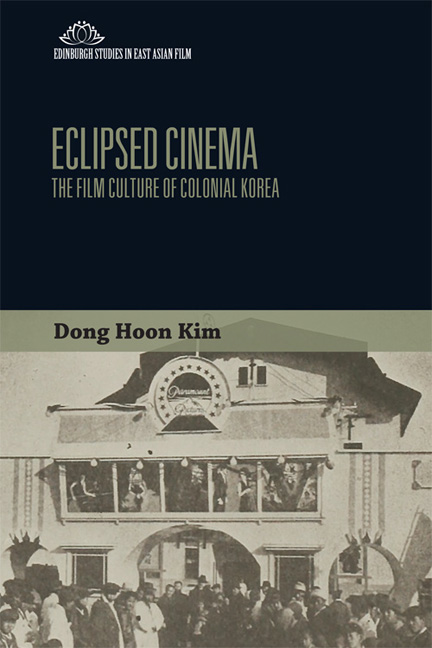Book contents
- Frontmatter
- Contents
- List of Figures
- Acknowledgements
- Introducing Joseon Cinema: the Question of Film History and the Film Culture of Colonial Korea
- 1 The Beginning: Towards a Mass Entertainment
- 2 Joseon Cinema, Cinematic Joseon: on Some Critical Questions of Joseon Cinema
- 3 Migrating with the Movies: Japanese Settler Film Culture
- 4 Colonial Film Spectatorship: Nationalist Enough?
- 5 Film Spectatorship and the Tensions of Modernity
- Conclusion: Integrating into the Imperial Cinema
- Notes
- Appendix
- Bibliography
- Index
4 - Colonial Film Spectatorship: Nationalist Enough?
Published online by Cambridge University Press: 03 January 2018
- Frontmatter
- Contents
- List of Figures
- Acknowledgements
- Introducing Joseon Cinema: the Question of Film History and the Film Culture of Colonial Korea
- 1 The Beginning: Towards a Mass Entertainment
- 2 Joseon Cinema, Cinematic Joseon: on Some Critical Questions of Joseon Cinema
- 3 Migrating with the Movies: Japanese Settler Film Culture
- 4 Colonial Film Spectatorship: Nationalist Enough?
- 5 Film Spectatorship and the Tensions of Modernity
- Conclusion: Integrating into the Imperial Cinema
- Notes
- Appendix
- Bibliography
- Index
Summary
In his article ‘A Trajectory of Joseon Cinema I’ (1946), which reflects on the colonial film culture with a focus on Hollywood's dominance in the Joseon film scene of the 1920s, film critic Kang So-cheon states that the popularity of Hollywood films among Korean film spectators is indicative of the essentially nationalist nature of colonial spectatorship. According to Kang, Korean filmgoers ignored Japanese films in favour of Hollywood productions – Universal studio pictures, in particular – as a way in which to express their anti-Japanese imperialism sentiments. The author further asserts that Japanese films were only consumed by Japanese settlers at Japanese movie houses while Korean filmgoers went to foreign films, and this ethnically distinctive movie-going pattern eventually turned Japanese movie theatres into second-rate ones, compared to the theatres geared towards Korean spectators. As I discussed in the preceding chapter, most of the films Korean filmgoers enjoyed were the products of Hollywood owing to the considerable lack of commercial Joseon films. In employing this historical fact, however, Kang's account of colonial film spectatorship, written only months after Korea's liberation from the colonial occupation, shows us how quickly postcolonial film historians engaged with an effort to redeem Korea's colonial history through the lens of nationalism. The author's problematic manipulation of historical facts in his attempt to overstate Korean film spectators’ nationalism, therefore, deserves more critical attention. Laced with an overtly nationalist historiographical approach, the critic considers Korean spectators’ assumed collective political disposition as the sole reason for the popularity of Hollywood productions, without taking industrial, institutional or cultural context into his assessment. In contradiction of the author's claim that Japanese theatres for Japanese migrants were inferior to Korean theatres and financially struggling, they were stable businesses and hugely outnumbered Korean theatres, as discussed in detail in the previous Chapter. As we have seen, moreover, Japanese films were hardly ever shown in Korean movie theatres because of the ethnically segregated film exhibition practice that resulted from cultural and language barriers.
- Type
- Chapter
- Information
- Eclipsed CinemaThe Film Culture of Colonial Korea, pp. 144 - 183Publisher: Edinburgh University PressPrint publication year: 2017



